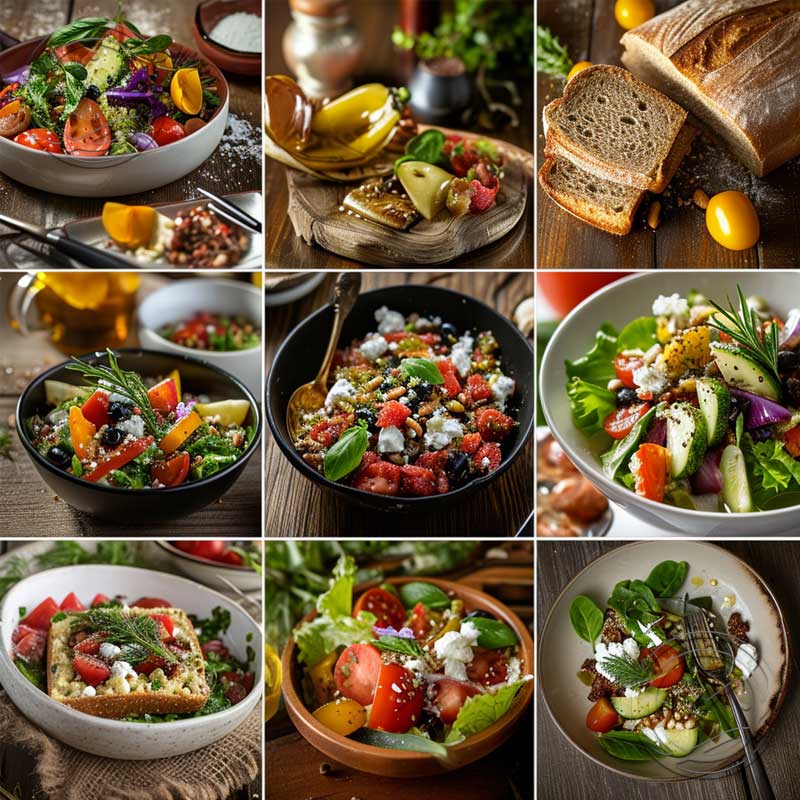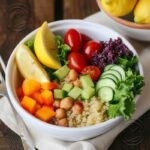Mediterranean Diet Ideas: Key Components
The Mediterranean diet is a healthy diet that is based on eating fruits, vegetables, whole grains, and fish.
It is also low in saturated fat and cholesterol.
The key components of the Mediterranean diet include:
- Fruits: Fruits are a good source of vitamins, minerals, and fiber. They are also low in calories and fat.
- Vegetables: Vegetables are a good source of vitamins, minerals, and fiber. They are also low in calories and fat.
- Whole grains: Whole grains are a good source of fiber, vitamins, and minerals. They are also low in calories and fat.
- Fish: Fish is a good source of protein, omega-3 fatty acids, and vitamins. It is also low in saturated fat and cholesterol.
The Mediterranean diet is a healthy diet that can help you maintain a healthy weight, reduce your risk of chronic diseases, and improve your overall health.
Benefits of Avocado in Mediterranean Meals
Avocados are a nutrient-rich fruit that is a staple of the Mediterranean diet.
They are a good source of fiber, vitamins, minerals, and healthy fats.
- Avocados are a good source of fiber, which can help to keep you feeling full and satisfied after eating.
- They are also a good source of vitamins C, E, and K, as well as potassium, magnesium, and folate.
- Avocados contain monounsaturated fats, which are a type of healthy fat that can help to lower cholesterol and improve heart health.
- Avocados are also a good source of antioxidants, which can help to protect cells from damage.
Avocados can be enjoyed in a variety of ways, including sliced on salads, as a guacamole dip, or mashed into a spread for sandwiches or toast.
They are a delicious and nutritious addition to any Mediterranean meal.
10 Quick Low-Carb Atkins Snacks
In a world where time is of the essence and carb-conscious eating is paramount, navigating snack choices can feel like…
The Role of Bulgur in Mediterranean Cuisine
Bulgur is a type of cracked wheat that is often used in Mediterranean cuisine.
It is a good source of fiber, protein, and iron, and it is also relatively low in calories.
Bulgur can be used in a variety of dishes, such as soups, salads, and pilafs.
It is also a popular ingredient in falafel and kibbeh.
Here are some of the benefits of incorporating bulgur into your diet:
- Bulgur is a good source of fiber. Fiber helps to keep you feeling full and satisfied after eating, and it can also help to lower cholesterol and improve digestive health.
- Bulgur is a good source of protein. Protein is essential for building and repairing muscle tissue, and it can also help to keep you feeling full and satisfied after eating.
- Bulgur is a good source of iron. Iron is essential for red blood cell production, and it can help to prevent anemia.
If you are looking for a healthy and nutritious way to add more whole grains to your diet, bulgur is a great option.
It is versatile and delicious, and it can be used in a variety of dishes.
Mediterranean Chicken
Chicken is a versatile and healthy protein that can be enjoyed in a variety of ways.
It is a good source of lean protein, vitamins, and minerals, and it is low in saturated fat.
Chicken is also a good source of niacin, phosphorus, and selenium.
Chicken is a good choice for the Mediterranean diet because it is a lean protein that is also versatile and flavorful.
It can be grilled, roasted, baked, or pan-fried, and it can be used in a variety of dishes, including salads, soups, stews, and casseroles.
Here are some of the benefits of chicken in the Mediterranean diet:
- Chicken is a good source of lean protein.
- Chicken is low in saturated fat.
- Chicken is a good source of vitamins, minerals, and antioxidants.
- Chicken is versatile and can be enjoyed in a variety of ways.
- Chicken is a good choice for people who are looking for a healthy and flavorful protein source.
If you are looking for a healthy and flavorful protein source, chicken is a great option.
It is a good source of lean protein, vitamins, and minerals, and it is low in saturated fat.
Chicken is also versatile and can be enjoyed in a variety of ways.
Flexitarian Diet 7-Day Meal Plan
Dive into a 7-day meal plan filled with delicious and nutritious options, explore the health benefits it brings, and learn…
Incorporating Cucumber into Your Diet
Cucumbers are a versatile and healthy addition to any diet.
They are low in calories and carbs, and they are a good source of vitamins, minerals, and fiber. Here are some of the benefits of incorporating cucumbers into your diet:
- Cucumbers are a good source of water. They are made up of over 90% water, which can help to keep you hydrated.
- Cucumbers are a good source of vitamins and minerals. They are a good source of vitamins A, C, and K, as well as potassium, magnesium, and phosphorus.
- Cucumbers are a good source of fiber. Fiber can help to keep you feeling full and satisfied, and it can also help to improve your digestive health.
- Cucumbers have antioxidant properties. Antioxidants can help to protect your cells from damage, and they may also help to reduce your risk of some chronic diseases.
- Cucumbers are low in calories and carbs. They are a great way to add flavor and nutrition to your meals without adding a lot of calories or carbs. Cucumbers can be enjoyed in a variety of ways.
They can be eaten raw, added to salads, or used in soups, stews, and other dishes. If you are looking for a healthy and versatile way to add more fruits and vegetables to your diet, consider incorporating cucumbers.
Health Benefits of Fish in the Diet
Fish is a healthy part of a balanced diet.
It is low in saturated fat and cholesterol, and it is a good source of protein, vitamins, minerals, and omega-3 fatty acids.
Omega-3 fatty acids are essential fatty acids that the body cannot produce on its own.
They are important for heart health, brain function, and immune function.
Fish is a good source of omega-3 fatty acids, especially fatty fish such as salmon, tuna, mackerel, and sardines.
Eating fish has been linked to a number of health benefits, including:
- Reduced risk of heart disease
- Reduced risk of stroke
- Reduced risk of type 2 diabetes
- Improved cognitive function
- Reduced inflammation
- Improved mood
If you are not a fan of fish, there are other ways to get omega-3 fatty acids into your diet.
You can take a fish oil supplement, or you can eat foods that are fortified with omega-3 fatty acids, such as eggs and yogurt.
Fish is a healthy and nutritious food that can provide a number of health benefits.
Eating fish regularly is a good way to improve your overall health.
Mediterranean Diet Wine Pairings
Discover the tantalizing world of Mediterranean wine pairings! Dive into the health benefits of the Mediterranean diet, known for reducing…
Feta: A Mediterranean Diet Staple
Feta cheese is a type of brined curd cheese that is made from sheep’s milk.
It is a staple of the Mediterranean diet and is often used in salads, sandwiches, and pizzas.
Feta is a good source of protein, calcium, and phosphorus.
It is also low in saturated fat and cholesterol. Feta cheese has a number of health benefits.
It is a good source of protein, which is essential for building and maintaining muscle mass.
It is also a good source of calcium, which is important for bone health.
Feta cheese is also a good source of phosphorus, which is important for energy metabolism. In addition to its nutritional benefits, feta cheese also has a number of culinary benefits.
It has a salty, tangy flavor that makes it a versatile ingredient that can be used in a variety of dishes.
Feta cheese can be used to add flavor to salads, sandwiches, pizzas, and other dishes. If you are looking for a healthy and flavorful way to add protein and calcium to your diet, feta cheese is a great option.
It is a versatile ingredient that can be used in a variety of dishes.
Feta cheese is also a good source of nutrients, including protein, calcium, and phosphorus.
Crafting Delicious Hummus Variations
Hummus is a delicious and versatile dip that can be enjoyed as a snack or as part of a meal.
It is made from chickpeas, tahini, olive oil, lemon juice, and garlic.
Hummus can be flavored with a variety of ingredients, such as roasted red peppers, sun-dried tomatoes, or roasted garlic.
Here are three delicious hummus variations that are sure to please:
Roasted Red Pepper Hummus
This hummus is made with roasted red peppers, which give it a smoky flavor.
To make this hummus, roast a red bell pepper in the oven until the skin is charred.
Remove the skin from the pepper and add it to a food processor along with the chickpeas, tahini, olive oil, lemon juice, and garlic.
Blend until smooth.
Sun-dried Tomato Hummus
This hummus is made with sun-dried tomatoes, which give it a rich, umami flavor.
To make this hummus, soak a handful of sun-dried tomatoes in hot water for 15 minutes.
Drain the tomatoes and add them to a food processor along with the chickpeas, tahini, olive oil, lemon juice, and garlic.
Blend until smooth.
Roasted Garlic Hummus
This hummus is made with roasted garlic, which gives it a slightly sweet and nutty flavor.
To make this hummus, roast a head of garlic in the oven until the cloves are soft.
Remove the cloves from the garlic and add them to a food processor along with the chickpeas, tahini, olive oil, lemon juice, and salt.
Blend until smooth.
These hummus variations are all delicious and healthy.
They are a great way to add protein and fiber to your diet.
Serve them with pita bread, vegetables, or crackers for a healthy and satisfying snack or meal.
Lemon: Enhancing Mediterranean Flavors
Lemons are a key ingredient in many Mediterranean dishes, adding a tart and acidic flavor that helps to balance out the richness of other ingredients.
Lemons are also a good source of vitamin C, potassium, and other nutrients.
Here are some of the ways that lemons are used in Mediterranean cuisine:
- Lemon juice is used to flavor seafood, chicken, and vegetables.
- Lemon zest is used to add a citrusy flavor to cakes, cookies, and other desserts.
- Lemons are also used to make lemonade, sorbet, and other refreshing drinks.
If you’re looking for a way to add a touch of Mediterranean flavor to your cooking, try using lemons!
The Importance of Olive Oil
Olive oil is a key component of the Mediterranean diet, and for good reason.
It is a healthy fat that is rich in monounsaturated fatty acids, which have been shown to lower cholesterol and improve heart health.
Olive oil is also a good source of antioxidants, which can help protect cells from damage. In addition to its health benefits, olive oil also adds flavor and richness to Mediterranean dishes.
It is used in a variety of ways, including drizzling over salads, roasted vegetables, and grilled meats.
Olive oil can also be used to make sauces, dips, and marinades.
If you are looking for a healthy and flavorful way to add more olive oil to your diet, try some of these tips:
- Drizzle olive oil over your morning toast instead of butter.
- Use olive oil to cook your vegetables instead of butter or oil.
- Make your own salad dressing with olive oil, vinegar, and herbs.
- Marinate your meats in olive oil, lemon juice, and herbs before grilling.
By incorporating more olive oil into your diet, you can enjoy the many health benefits of this versatile and delicious ingredient.
Using Onion in Mediterranean Dishes
Onion is a versatile ingredient that can be used in a variety of Mediterranean dishes.
It is a good source of vitamins, minerals, and antioxidants, and it can help to improve digestion.
Onions are also a good source of flavor, and they can add depth and complexity to any dish.
Here are some tips for using onion in Mediterranean dishes:
- Use a variety of onions in your dishes. There are many different types of onions available, each with its own unique flavor. Some popular varieties of onions include white onions, yellow onions, red onions, and Vidalia onions.
- Sauté onions before adding them to other dishes. This will help to bring out their flavor and sweetness.
- Add onions to soups, stews, and casseroles. Onions can help to thicken and flavor these dishes.
- Use onions in salads, sandwiches, and wraps. Onions can add a refreshing crunch to these dishes.
- Roast onions for a delicious side dish. Roasted onions are a great way to enjoy the natural sweetness of onions.
Onion is a delicious and nutritious ingredient that can be used in a variety of Mediterranean dishes.
By following these tips, you can add more onion to your diet and enjoy all of its benefits.
Oregano: A Versatile Mediterranean Herb
Oregano is a Mediterranean herb that is used in a variety of dishes.
It has a strong, pungent flavor that can add depth and flavor to any dish.
Oregano is also a good source of antioxidants, which can help to protect the body from damage.
Here are some of the ways that oregano is used in Mediterranean cuisine:
- It is used as a seasoning for grilled meats, fish, and vegetables.
- It is added to soups, stews, and sauces.
- It is used to make pesto sauce.
- It is used to flavor olive oil.
Oregano is a versatile herb that can be used in a variety of dishes.
It is a good source of antioxidants and can add flavor and depth to any dish.
Pita Bread: A Mediterranean Diet Essential
Pita bread is a flatbread that is made from wheat flour, water, yeast, and salt.
It is a staple of the Mediterranean diet and is often used to make wraps, sandwiches, and pizzas.
Pita bread is also a good source of fiber and protein.
- Pita bread is a good source of fiber.
- Pita bread is a good source of protein.
- Pita bread is versatile and can be used in a variety of dishes.
- Pita bread is a healthy and affordable option for people of all ages.
If you are looking for a healthy and delicious way to add more whole grains to your diet, pita bread is a great option.
It is versatile, affordable, and a good source of fiber and protein.
Integrating Quinoa into Mediterranean Meals
Quinoa is a gluten-free grain that is high in protein and fiber.
It is a good source of vitamins, minerals, and antioxidants.
Quinoa can be used in a variety of Mediterranean dishes, including salads, soups, stews, and pilafs.
- Add quinoa to salads. Quinoa can be added to salads in place of or in addition to other grains, such as couscous or bulgur. Quinoa adds a boost of protein and fiber to salads, and it can help to keep you feeling full longer.
- Use quinoa in soups and stews. Quinoa can be added to soups and stews to thicken them and add a boost of protein and fiber. Quinoa cooks quickly, so it is a good option for soups and stews that are made on the stovetop.
- Make quinoa pilafs. Quinoa pilafs are a great way to use up leftover vegetables. Quinoa can be cooked in broth or water, and then mixed with vegetables, herbs, and spices. Quinoa pilafs are a healthy and satisfying way to enjoy a variety of vegetables.
Quinoa is a versatile grain that can be used in a variety of Mediterranean dishes.
By incorporating quinoa into your meals, you can increase your intake of protein, fiber, vitamins, and minerals.
Preparing Nutritious Salmon Dishes
Salmon is a delicious and nutritious fish that is a great source of protein, omega-3 fatty acids, and vitamins.
Here are 5 salmon dishes that are nutritious and delicious:
- Salmon Nuggets: These salmon nuggets are a great way to get kids to eat fish. They are made with tender pieces of salmon that are coated in a crispy breading and baked until golden brown.
- Salmon Teriyaki: This salmon teriyaki is a classic dish that is sure to please everyone. It is made with grilled salmon that is coated in a sweet and tangy teriyaki sauce.
- Salmon Salad: This salmon salad is a light and healthy meal that is perfect for summer. It is made with grilled salmon, fresh vegetables, and a light dressing.
- Salmon Croquettes: These salmon croquettes are a great way to use up leftover salmon. They are made with mashed potatoes, salmon, and a few other ingredients.
- Salmon Chowder: This salmon chowder is a hearty and comforting soup that is perfect for a cold winter day. It is made with salmon, vegetables, and a creamy broth.
Tomato-Based Recipes for the Diet
- Roasted Tomato Soup: This soup is a classic Mediterranean dish that is perfect for a cold winter day. It is made with roasted tomatoes, garlic, onion, and basil.
- Tomato Bruschetta: This is a simple but delicious appetizer that is perfect for a summer party. It is made with grilled bread, tomatoes, garlic, basil, and olive oil.
- Tomato Salad: This salad is a great way to use up summer tomatoes. It is made with tomatoes, cucumbers, red onion, olives, and feta cheese.
- Tomato Sauce: This sauce is a great way to add flavor to pasta, pizza, or chicken. It is made with tomatoes, garlic, onion, basil, and oregano.
Tuna: A Lean Protein Source
Tuna is a lean, white fish that is a popular choice for people who are following the Mediterranean diet.
It is a good source of protein, omega-3 fatty acids, and vitamins and minerals.
- Tuna is a good source of protein.
- Tuna is a good source of omega-3 fatty acids.
- Tuna is a good source of vitamins and minerals.
Tuna can be eaten in a variety of ways, including grilled, baked, or canned.
It can be used in salads, sandwiches, soups, and casseroles. Tuna is a versatile and healthy protein source that is a good fit for the Mediterranean diet.
It is a good choice for people who are looking for a way to add more seafood to their diet.
Balancing Your Diet with Whole Grains
Whole grains are an important part of a healthy diet.
They are a good source of fiber, vitamins, minerals, and antioxidants.
Fiber helps to keep you feeling full and satisfied, and it can also help to lower cholesterol and blood sugar levels.
Whole grains also provide energy and help to keep your digestive system healthy.
The Mediterranean diet is a healthy diet that is based on eating fruits, vegetables, whole grains, and fish.
It is also low in saturated fat and cholesterol.
Whole grains are an important part of the Mediterranean diet, and they are included in many traditional Mediterranean dishes.
- Whole grains are a good source of fiber.
- Fiber helps to keep you feeling full and satisfied.
- Fiber can help to lower cholesterol and blood sugar levels.
- Whole grains provide energy and help to keep your digestive system healthy.
- Whole grains are an important part of the Mediterranean diet.
If you are looking to improve your health, you should consider adding more whole grains to your diet.
Whole grains are a healthy and delicious way to get the nutrients you need.
Here are some tips for incorporating more whole grains into your diet:
- Choose whole-wheat bread, pasta, and cereal.
- Add whole-wheat flour to your baking recipes.
- Snack on whole-grain crackers, pretzels, and popcorn.
- Include whole grains in your soups, salads, and stews.
By following these tips, you can easily add more whole grains to your diet and improve your overall health.
Conclusion
The Mediterranean diet is a healthy diet that is based on eating fruits, vegetables, whole grains, and fish.
It is also low in saturated fat and cholesterol.
- The Mediterranean diet has been shown to improve heart health, reduce the risk of stroke, and lower blood pressure.
- The Mediterranean diet is also good for weight loss and can help to maintain a healthy weight.
- The Mediterranean diet is a delicious and satisfying way to eat, and it is easy to incorporate into your daily life.
If you are looking for a healthy and delicious way to eat, the Mediterranean diet is a great option.







